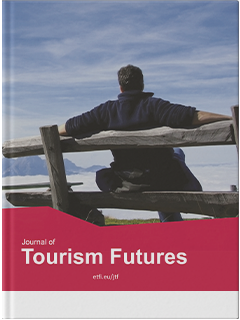A “new tourism cycle” on the Canary Islands: scenarios for digital transformation and resilience of small and medium tourism enterprises
IF 5.8
Q1 HOSPITALITY, LEISURE, SPORT & TOURISM
引用次数: 2
Abstract
PurposeThis paper discusses plausible future scenarios for small and medium tourism enterprises (SMTEs) in the “sun, sea and sand” destination of the Canary Islands (Spain) and assesses to what extent they are prepared to adjust to market changes and technological developments in the light of both sudden disruptions and long-term shocks.Design/methodology/approachA scenario analysis was made based upon expert interviews, leading to a 2 × 2 scenario matrix.FindingsAlthough regional, national and European strategies advocate digital transformation as a step towards building resilience and towards a more sustainable future, this study identifies two major uncertainties that can put that transformation at risk: a change of the traditional “sun, sand and sea” visitor to a more conscious, individual and inquisitive traveller or “Promad”, and the business culture of SMTEs.Research limitations/implicationsResilience for sudden and for slow-paced disruptions poses different challenges for SMTEs. Their next step in the digital transformation must take them form marketing and sales-oriented e-business to growing interconnectivity and innovation across supply chains.Practical implicationsA market change towards the “Promad” type of traveller causes at least a temporary mismatch of demand and supply. As many SMTEs miss either the knowledge or the resources to invest in digital transformation, the process will depend on support and coordination at destination level.Originality/valueThe study identifies, with the example of the Canary Islands, the difficulties for destinations and individual businesses in making the envisioned transition of mass tourism to more competitive forms of tourism with a smaller ecological footprint.加那利群岛的“新旅游周期”:中小型旅游企业数字化转型和应变能力的情景
目的本文讨论了加那利群岛(西班牙)“阳光、大海和沙滩”目的地的中小型旅游企业(SMTE)的合理未来情景,并评估了它们在多大程度上准备在突然中断和长期冲击的情况下适应市场变化和技术发展。设计/方法论/方法基于专家访谈进行情景分析,得出2×2的情景矩阵。发现尽管地区、国家和欧洲的战略都主张数字化转型是建立韧性和迈向更可持续未来的一步,但这项研究发现了两个可能使转型面临风险的主要不确定性:传统的“阳光、沙滩和海洋”游客变为更有意识、更个性、更好奇的旅行者或“Promad”,以及SMTE的商业文化。研究局限性/含义对突然和慢节奏中断的恢复能力对SMTE提出了不同的挑战。他们数字化转型的下一步必须将他们从以营销和销售为导向的电子商务转变为跨供应链的互联互通和创新。实际含义市场向“Promad”型旅行者的转变至少会导致需求和供应暂时不匹配。由于许多SMTE错过了投资于数字化转型的知识或资源,这一过程将取决于目的地层面的支持和协调。独创性/价值该研究以加那利群岛为例,确定了旅游目的地和个体企业在实现大众旅游向更具竞争力、生态足迹更小的旅游形式转型方面的困难。
本文章由计算机程序翻译,如有差异,请以英文原文为准。
求助全文
约1分钟内获得全文
求助全文
来源期刊

Journal of Tourism Futures
HOSPITALITY, LEISURE, SPORT & TOURISM-
CiteScore
15.70
自引率
6.00%
发文量
64
审稿时长
34 weeks
期刊介绍:
 求助内容:
求助内容: 应助结果提醒方式:
应助结果提醒方式:


